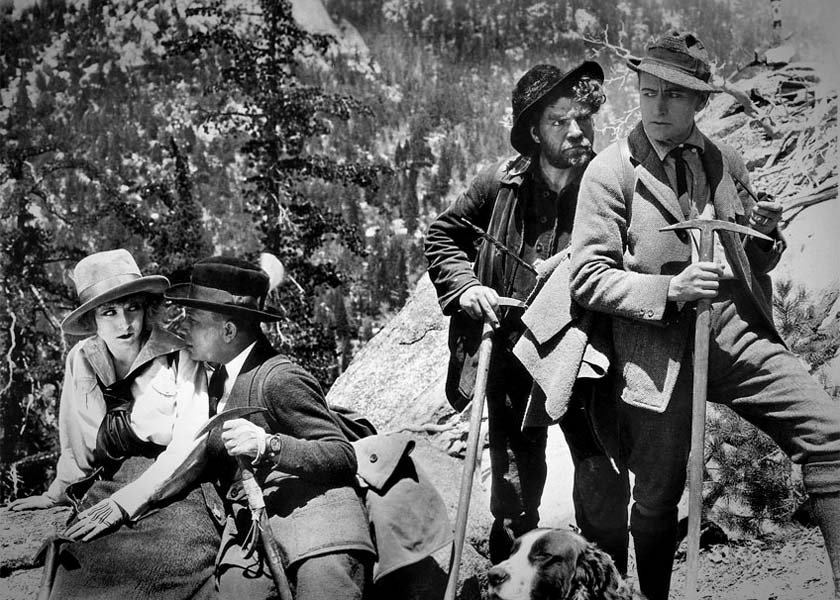Synopsis
Dr. Armstrong (De Grasse), his wife Margaret (Bellington), and Lieutenant Erich
Von Steuben (von Stroheim), an Austrian, arrive by coach at a village in the
Dolomites, a mountain range in the Italian Alps. The observant lieutenant has
noted that Margaret is beautiful, that her husband ignores her, and that she is
bored and dissatisfied. Soon after their arrival in the village, the climbing
guide Silent
Sepp (Gowland), a friend of the doctor, notes Von Steuben's
attentions to Margaret. At the inn, Von Steuben pursues the neglected wife. He
buys her a gift and uses it to gain entrance to her room. He presses her with his
embrace and kisses. She agrees to a rendezvous.
Dr. Armstrong and Von Steuben have arranged to climb the Pinnacle, one of the highest peaks in the Dolomites. The doctor, Margaret, Von Steuben and Sepp travel to a lodge which is the staging point for the climb. That night, Margaret slides a note under Von Steuben's door. He reads it, smiles, and puts it in his coat pocket. However, his attempt to enter Margaret's room is thwarted by Sepp.
The next day, Dr. Armstrong and Von Steuben, roped together, climb to the top of
the Pinnacle. Dr. Armstrong sees his wife's note and takes it out of the pocket of
the lieutenant's jacket. Before he can read it, the lieutenant reaches for it and
knocks it away. The note floats down the mountain. The doctor seizes Von Steuben
by the neck and demands the truth. Did his wife agree to a meeting? When Von
Steuben says yes
, the doctor sits down in brooding sorrow. Von Steuben
takes out a knife and contemplates stabbing him, but does not. Despite Von
Steuben's protests that the doctor cannot leave an inexperienced climber, the
doctor cuts the rope joining them, and starts to descend alone. Partway down the
doctor finds the note. In it, Margaret writes that she promised a meeting only to
save herself and that she loves her husband. She tells Von Steuben not to bother
her any longer. The doctor, realizing that Von Steuben lied, starts back up, but
slips and falls.
At the lodge, Margaret has become anxious and convinces Sepp to lead a rescue
party. Sepp goes ahead of the party, finds the injured doctor, and lowers him to
Margaret and the rescue party. Sepp, Margaret and some of the others take the
doctor down the mountain. The remainder of the party continues after Von Steuben.
At the Pinnacle, the terrified Von Steuben has been calling for help. The shadow
of a large bird crosses over him, and he sees a figure nearby. As the rescue party
ascends, his body hurtles past them. A title says that
The spirit of the mountain had spoken, everything was still, as still as
everlasting death.
Their holiday ended, the doctor and his wife leave the village in the coach.
Sitting close together, the doctor holds her hand and kisses it.
Discussion
Blind Husbands was the first film directed by Erich von Stroheim, and
is based on his story The Pinnacle
. The film features the first appearance
of Stroheim's favorite screen persona, the lecherous, perfectly mannered,
immaculately dressed Austrian officer. The character's principle interest is
flattering and making love to any available young woman. Wine, song and jewelry
are his tools; boudoirs and ballrooms are his preferred localities. However, the
Austrian officer is weak and defenseless when pitted against the men attached to
these women, and this frequently leads him to disaster and death. For Lieutenant
Erich Von Steuben, the end comes when he is isolated atop the Pinnacle with the
doctor. He is unable to admit his failure at seducing the doctor's wife,
preferring the doctor to believe himself a cuckold. This misplaced pride proves
Von Steuben's ruin, as he lacks the skills to descend the mountain by himself when
he is abandoned by the furious doctor. Blind Husbands was the
protoype of this character, who would appear again in subsequent Stroheim films
such as Foolish Wives (1922) and
The Wedding March (1928).
Further Reading

